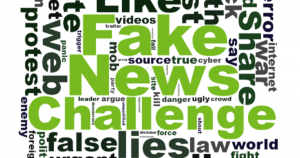The organizers of the The Fake News Challenge have subjected it to a significant overhaul. In this light, many of my criticisms of the challenge no longer apply.
 Some context:
Some context:
Last month, I posted a critical piece addressing the fake news challenge. Organized by Dean Pomerleau and Delip Rao, the challenge aspires to leverage advances in machine learning to combat the epidemic viral spread of misinformation that plagues social media. The original version of the the challenge asked teams to take a claim, such as “Hillary Clinton eats babies”, and output a prediction of its veracity together with supporting documentation (links culled from the internet). Presumably, their hope was that an on-the-fly artificially-intelligent fact checker could be integrated into social media services to stop people from unwittingly sharing fake news.
My response criticized the challenge as both ill-specified (fake-ness not defined), circular (how do we know the supporting documents are legit?) and infeasible (are teams supposed to comb the entire web?)
Continue reading “Fake News Challenge – Revised and Revisited”